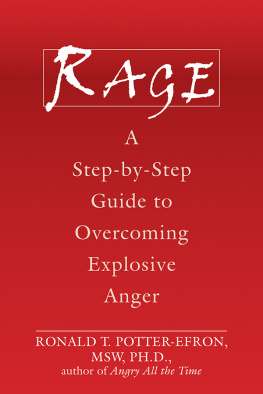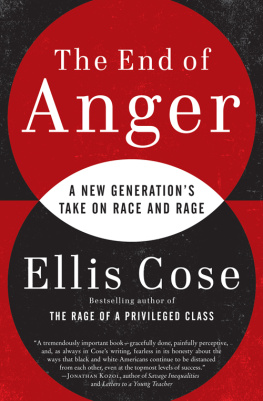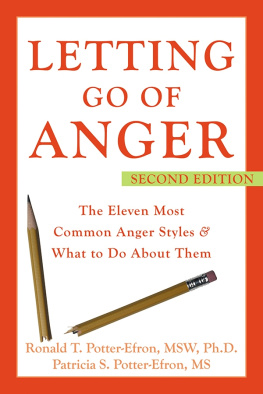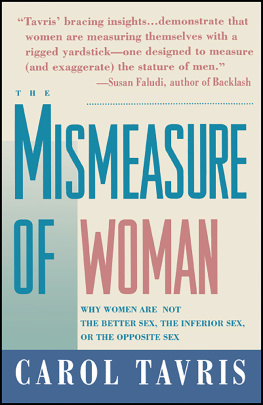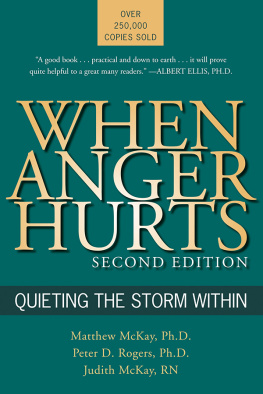I first want to express my thanks to Brady Kahn, the editor of this book on rage, for her thoughtful and careful work. Also, my thanks to Matt McKay, Catharine Sutker, and the many professionals at New Harbinger Publications for continuing to support my writings in the area of anger.
Next, I thank several residents of a nearby boot camp who allowed me to interview them as they described their rages, near rages, and partial rages. Their openness helped me better understand the raging phenomenon.
Finally, I thank those people who read early versions of this book. Their comments helped me write more clearly and meaningfully. Readers included Charles Spielberger, Richard Pfeiffer, Pat Potter-Efron, Dave McQuarrie, Marie McDade, Rich Dowling, Linda Klitzke, and Alex Roseborough. Many of these people are connected with the National Anger Management Association in New York City or with First Things First Counseling in Eau Claire, Wisconsin.
Are You a Rager?
Something strange and scary happens to some people. On occasion, they lose control over their bodies, their brains, and their behavior. They say and do things that they later deeply regret. To illustrate, let me introduce you to four people who rage.
Lyle: A Victim of Child Abuse Still Fighting for His Life
Lyle almost died when he was only eight years old. His dad just about killed him. All hed done was to forget to stack firewood for the woodstove. Dad came home, saw it wasnt done, and beat Lyle unconscious. His ma took him to the hospital. She lied, of course, about what happened. Told the doctors Lyle had fallen and smacked his head. Maybe they believed her. Maybe not. They patched him up. After that, Lyle never was the same. He got mean. He hated his dad. Finally, at age sixteen, Lyle was big enough to turn the tables. One night he went crazy. He doesnt remember what happened. His kid sister told him he started screaming at their father and then charged right at him. He knocked his dad down and kicked him. He beat the crap out of his father.
Heres the problem. Lyles a thirty-year-old man now. But he cant control his emotions. He gets angry a lot. Really angry. And then he blacks out, just like that first time at age sixteen. Lyles afraid hell kill somebody one day. And he mightunless he gets some help soon.
Brenda: The Woman Whom Everybody Ignores
Brenda has always been the kind of person who blends into the background. Not very noticeable. Nice, but nothing special about her. Quiet. There she is now, smiling at her boss as he jokingly ignores all her good ideas. And, at the party, Brenda seems not to mind that her husband openly flirts with other women. Ah, but if people could only read her mind, theyd discover that Brendas fuming inside. Maybe then they wouldnt be so surprised when she snaps, something she does about once a month. Man, you wouldnt believe the words that come out of that womans mouth! Its like she isnt herself. Afterwards, Brenda always says shes sorry. She feels horrible about what shes said. But Brenda also says she cant control herself. Its like those words just roll off her tongue without her having any say in the matter. Its almost as if someone else, not Brenda, were speaking.
Ricardo: A Proud Man Too Easily Humiliated
Ricardo is a hard worker and a good provider. Unfortunately, though, he has very fragile self-esteem. He wants to believe hes a winner, but hes secretly afraid hes really a loser in life. That makes him very sensitive to criticism. So, the other day, when his boss told him that he had to redo some paperwork, Ricardo blew a fuse. Who are you to tell me what to do, you fat old pig? he yelled at his boss. He got so angry that two security men had to escort him out of the office. He lost his job that day, just as hed lost several previous jobs. I just cant take it when they put me down, he sobbed to his wife later that day. I tell myself to stay calm, but I just cant. Something happens to me, and I go crazy.
Sharelle: A Woman Who Cannot Handle Abandonment
Heres Sharelles story: My boyfriend said he needed a little more space. He said we were getting too close. I went nuts. I threw a vase at his head. Sharelle gets so preoccupied with the men she falls in love with that she loses herself. She becomes really jealous, too. She better not catch her man so much as peeking at another woman, or all hell will break loose. But mostly, Sharelle is terrified of being abandoned. That probably goes back to when her mother died when Sharelle was only five years old. Her father disappeared from her life a couple years later. So when her boyfriend backs off even a little bit, Sharelle has an immediate meltdown. She cries uncontrollably. She shakes. Once she got so angry that she aimed a shotgun right at her boyfriends heart. At least she thinks she did that. Her memory of events like this is pretty vague.
Lyle, Brenda, Ricardo, and Sharelleand perhaps you, the reader, as wellall suffer from rage. This mysterious event can be defined as an experience of excessive anger accompanied by partial or complete loss of conscious awareness, a normal sense of self, and/or behavioral control. Each of these people becomes, for a little while, someone different from themselves. As one of my clients told me of how hed jumped out of a car to pummel a man who had just insulted him, Someone else got out of that car. It wasnt really me.
How Common Is Raging?
If you are a rager, you may believe you are the only person on this planet with that particular problem. Actually, you have plenty of company. In fact, author and psychiatrist John Ratey (Ratey and Johnson 1998), in reviewing the literature on rage, writes that one in five normal, everyday people experiences violent attacks of rage that he or she cannot control (149). Now this doesnt mean that 20 percent of the population gets homicidally mad on a regular basis. But, what it does mean is that many people do become so irate, from time to time, that they say and do things they later regret. Furthermore, these individuals often say that they dont like losing control that way but that, when it happens, they truly cannot stop themselves.
I am a clinical psychotherapist in Eau Claire, Wisconsin. Eau Claire is a rather sleepy city of only 60,000 people. It is family oriented, religious, and quiet. There are no real gangs in Eau Claire, Wisconsinjust a few wannabes. In other words, you would probably expect there to be precious few ragers in my humble burg. You would be wrong. My caseload is full of people who display both sudden and seething ragesshort-fused screamers and long-term resenters. Abandonment rages are routine, since Eau Claire suffers from the same problem with failing relationships that is so common everywhere in the United States. Job layoffs have added to many workers sense of impotent rage. Too many of the people in my town feel tremendous shame and sometimes react with great anger to the slightest insult. And, sadly, Eau Claire has its full share of men and women who have survived severe trauma, only to be left with a terrified, defensive stance toward life.
I believe Rateys statistics. I agree that 20 percent of the population rages at least occasionally. That makes rage a significant problem in American society (and probably in many other countries as well).
A Closer Look at Rage
Lets break down the definition of rage into its component pieces:

